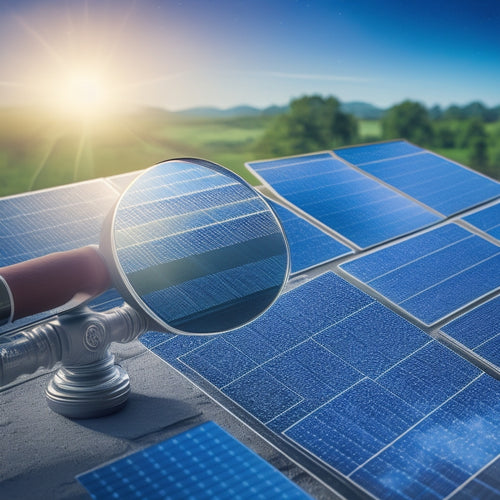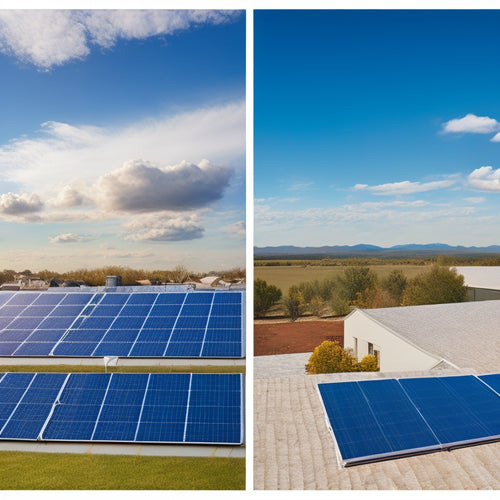
5 Best Renewable Energy Solutions for Homes
Share
You're exploring the best renewable energy solutions for your home, and you've got five promising options to evaluate. Solar power, with high-efficiency panels and proper installation, can capture up to 70% of sunlight as energy. Wind energy, using small turbines, can generate electricity, but noise levels and turbine size are vital factors. Geothermal heating and cooling systems employ the earth's temperature for efficient energy production. Hydroelectric power, particularly in off-grid systems, converts kinetic energy from water into electricity. Finally, biomass energy exploits organic waste for power generation, using conversion technologies like anaerobic digestion. All these options offer unique benefits, and understanding their complexities is essential to making an informed decision for your home.
Key Takeaways
- High-efficiency solar panels can capture up to 70% of sunlight, making them a top choice for homes seeking renewable energy solutions.
- Residential wind turbines can generate electricity, but noise levels and turbine size must be considered for optimal energy production.
- Geothermal heat pumps offer up to 400% efficiency, providing both heating and cooling while reducing carbon footprint and maintenance needs.
- Small-scale hydro systems can provide energy independence for off-grid homes, but require careful assessment of water flow and head.
- Biomass energy conversion technologies can turn organic waste into electricity, biogas, or heat, offering a sustainable solution for homes with ample waste resources.
Harnessing Solar Power Effectively
About 70% of sunlight that hits the Earth's surface can be captured as solar energy, making it a virtually limitless resource. You can tap into this potential by installing solar panels on your rooftop.
However, it's vital to maximize solar panel efficiency to generate adequate power for your home. One way to do this is by opting for high-efficiency panels with a higher wattage per square foot. Additionally, consider the panel's temperature coefficient, which affects its performance in hot climates. Proper installation and maintenance are also important to guarantee peak energy production.
To store excess energy generated during the day for nighttime use, you'll need energy storage solutions like batteries. These solutions enable you to utilize the full potential of solar power, even when the sun isn't shining.
Wind Energy for Residential Areas
Installed in open areas with decent wind speeds, wind turbines can be a viable alternative to traditional energy sources for residential areas. You can consider installing small wind turbines, which are designed for residential use, to generate electricity for your home. These turbines are typically smaller and less expensive than commercial wind turbines.
When evaluating wind energy for your home, consider the following factors:
| Factor | Description | Impact on Wind Energy |
|---|---|---|
| Wind Speed | Average wind speed in your area | Higher speeds increase energy production |
| Turbine Size | Size of the wind turbine | Larger turbines produce more energy, but may not be suitable for residential areas |
| Noise Level | Noise generated by the turbine | Quieter turbines are suitable for residential areas |
Residential wind farms, consisting of multiple small wind turbines, can also be a viable option for homeowners. By utilizing wind energy, you can reduce your reliance on traditional energy sources and lower your energy bills. However, it is crucial to conduct a thorough assessment of your location's wind resources and local regulations before investing in wind energy.
Geothermal Heating and Cooling
As you investigate alternative energy sources for your home, you may find that wind energy isn't the best fit for your location. Instead, consider geothermal heating and cooling, a reliable and efficient option.
Geothermal heat pumps utilize the consistent temperature of the earth to provide both heating and cooling. This ground source system involves burying pipes underground, where the earth's natural heat is absorbed and transferred to your home.
Geothermal heat pumps are highly efficient, with some systems achieving up to 400% efficiency. This means that for every unit of electricity used, you get four units of energy in return.
Additionally, geothermal systems are quiet, durable, and require minimal maintenance. They can also provide hot water and even cooling in the summer.
When choosing a geothermal system, consider factors such as the size of your home, local climate, and soil type. A properly sized and installed system can provide significant energy savings and reduce your carbon footprint.
With geothermal heating and cooling, you can enjoy a comfortable and sustainable living space while reducing your reliance on fossil fuels.
Hydroelectric Power for Homes
With the rise of renewable energy, homeowners are exploring alternative power sources to reduce their carbon footprint and energy bills. Hydroelectric power is one such option, offering a clean and reliable source of energy. If you have a stream or river nearby, you can tap into its energy to power your home.
Small scale hydro systems are designed for individual homes, providing off-grid energy independence. These systems typically consist of a turbine, generator, and control system, which convert the kinetic energy of flowing water into electrical energy.
When considering hydroelectric power for your home, assess the water flow and head (vertical distance) of your stream or river. A higher head and flow rate result in more power generation.
You'll also need to verify you have the necessary permits and comply with local regulations. Off-grid systems can be more expensive upfront, but they offer long-term energy savings and reduced environmental impact.
With proper installation and maintenance, hydroelectric power can provide a reliable and sustainable source of energy for your home.
Biomass Energy From Organic Waste
While hydroelectric power makes use of the energy of moving water, biomass energy taps into the potential of organic waste to generate power for your home. This renewable energy source involves the conversion of organic waste into energy through various biomass conversion technologies. You can exploit biomass energy from food waste, agricultural waste, and even sewage sludge.
Effective organic waste management is essential to maximize biomass energy production. You'll need to collect, sort, and process the waste materials to create a fuel source. This can be done through anaerobic digestion, combustion, or gasification.
Here's a comparison of biomass conversion technologies:
| Technology | Process | Energy Output |
|---|---|---|
| Anaerobic Digestion | Microbial breakdown of organic matter | Biogas (CH4, CO2) |
| Combustion | Burning of biomass materials | Heat, Electricity |
| Gasification | Partial oxidation of biomass | Syngas (CO, H2) |
| Pyrolysis | Thermal decomposition of biomass | Bio-oil, Char |
Frequently Asked Questions
Can I Install Renewable Energy Systems Myself?
You can attempt a DIY installation, but be aware that safety considerations are paramount; make certain you're knowledgeable about electrical systems, follow manufacturer guidelines, and adhere to local building codes to avoid risks and guarantee a successful, efficient setup.
How Much Maintenance Do Renewable Energy Systems Require?
As you utilize the power of nature, you'll find that regular tune-ups are essential to maintaining peak system performance; neglecting maintenance can lead to reduced energy output and increased cost considerations, so stay on top of it to reap the benefits.
Can I Sell Excess Energy Back to the Grid?
You can sell excess energy back to the grid through net metering benefits, where your utility company gives you credit for excess generation, and energy buyback policies, which allow you to profit from your renewable energy investment.
Are Renewable Energy Systems Compatible With My Old Home?
You're concerned your old home won't mesh with renewable energy systems, but think of it like upgrading a classic car - with careful integration, its historic charm can merge seamlessly with modern energy efficiency, ensuring a harmonious blend of past and present.
What Are the Environmental Benefits of Renewable Energy Systems?
You'll considerably reduce your carbon footprint by adopting renewable energy systems, which decrease reliance on fossil fuels and lower greenhouse gas emissions, ultimately leading to energy independence and a cleaner environment.
Related Posts
-

10 Essential Bike Lane Safety Features to Consider
You're designing a bike lane with safety in mind, and that's essential. The National Highway Traffic Safety Administr...
-

Solar Panel System Certification Costs: A 10-Point Breakdown
You're looking to understand the costs associated with solar panel system certification. Your total certification cos...
-

Tracking Solar Panels Vs Fixed Panels Cost Savings
When considering solar panel options, you'll want to weigh the cost savings of tracking solar panels versus fixed pan...


